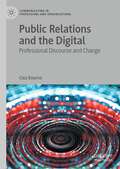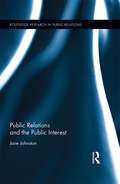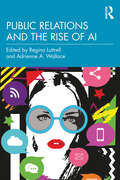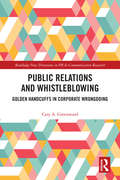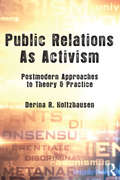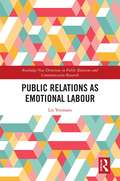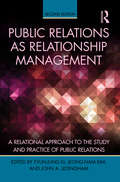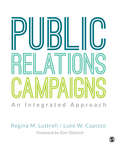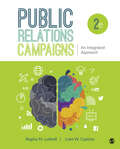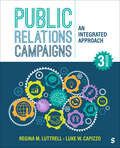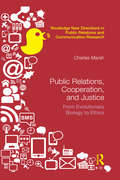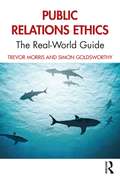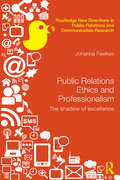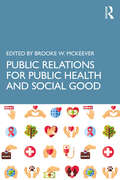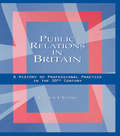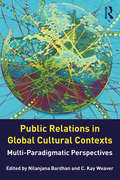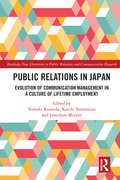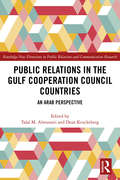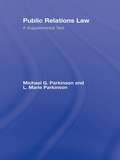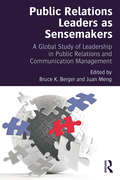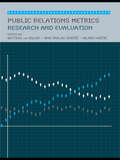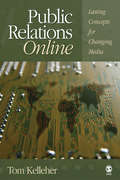- Table View
- List View
Public Relations and the Digital: Professional Discourse and Change (Communicating in Professions and Organizations)
by Clea BourneThis book takes a people-centred approach to the ever-fluid and rapidly-transforming professional world of public relations (PR) in the age of digital platforms. As everyday PR work becomes increasingly shaped by the platform economy, this is transforming how the PR profession talks about itself, its issues and concerns. Drawing on different textual genres and discursive strategies, the author examines the shifting boundaries between PR and adjacent fields such as advertising, marketing and journalism – and illuminates varied lifeworlds of PR professionals from different backgrounds, races and genders. Written for academics, practitioners and those interested in the world of public relations, the book will also be enjoyed by young professionals working in this interesting and fast-changing occupation.
Public Relations and the Public Interest (Routledge Research in Public Relations)
by Jane JohnstonIn this book, Johnston seeks to put the public interest onto the public relations ‘radar’, arguing the need for its clear articulation into mainstream public relations discourse. This book examines literature from a range of fields and disciplines to develop a clearer understanding of the concept, and then considers this within the theory and practice of public relations. The book’s themes include the role of language and discourse in establishing successful public interest PR and in perpetuating power imbalances; intersections between CSR, governance, law and the public interest; and how activism and social media have invigorated community control of the public interest. Chapters explore the role of the public interest, including cross-cultural and multicultural challenges, community and internal consultation, communication choices and listening to minorities and subaltern publics.
Public Relations and the Rise of AI
by Regina Luttrell Adrienne A. WallaceThis book explores the potential of artificial intelligence (AI) to transform public relations (PR) and offers guidance on maintaining authenticity in this new era of communication.One of the main challenges PR educators, researchers, and practitioners face in the AI era is the potential for miscommunication or unintended consequences of using AI tools. This volume provides insights on how to mitigate these risks and ensure that PR strategies are aligned, offering practical guidance on maintaining trust and authenticity in PR practices. Readers will learn to leverage AI for enhanced communication strategies and real-time audience engagement while navigating the ethical and legal implications of AI in PR. Featuring contributions from leading scholars, the book includes case studies and examples of AI-driven PR practices, showcasing innovative approaches and lessons from well-known brands. It offers a global perspective on AI’s impact on PR, with insights for practitioners and scholars worldwide.This book equips public relations educators, researchers, and professionals with the knowledge and tools they need in the changing landscape of communication in the age of AI.
Public Relations and Whistleblowing: Golden Handcuffs in Corporate Wrongdoing (Routledge New Directions in PR & Communication Research)
by Cary A. GreenwoodThere is a growing interest in corporate whistleblowing, but no comprehensive research has yet focused on public relations practice. Drawing on extensive research on Fortune 1000 and Wilshire 5000 corporations, this book reveals executives’ attitudes and relationships toward their organizations and their impact on whistleblowing. Perhaps unsurprisingly, it reveals that wrongdoing in corporations and the privileges of power coexist. Top-ranking public relations executives, who are mostly white and male, are more likely to be aware of wrongdoing but no more likely to blow the whistle, fundamentally due to their positive relationship with their employers. Using the new lens of evolutionary theory, this study explains whistleblowing, retaliation, and relationships, and in the light of the connection between whistleblowing behavior and executives’ attitudes, it proposes a new theory of the phenomenon of Golden Handcuffs. As public attitudes to corporations, corporate social responsibility (CSR), and transparency harden, these findings have serious implications for companies globally. Researchers, scholars, and advanced students in public relations, organizational communication, corporate communication, strategic communication, corporate reputation, and CSR will find this book full of revealing insights.
Public Relations As Activism: Postmodern Approaches to Theory & Practice (Routledge Communication Series)
by Derina R. HoltzhausenThis volume applies postmodern theory to public relations, providing an alternative lens to public relations theory and practice and developing public relations theory within the context of postmodernism. Author Derina R. Holtzhausen focuses on two key issues and their application to public relations theory and practice: the postmodernization of society, and the possibilities postmodern theories offer to explain and understand public relations practice in today’s changing society. Holtzhausen's argument is that existing theory should be evaluated from a postmodern perspective to determine its applicability to postmodernity. Utilizing practitioner perspectives throughout the volume, she explores the practice of public relations as a form of activism. The volume is intended for scholars and students in public relations. It may be used as a supplemental text in advanced courses on public relations theory, PR management, organizational communication, and related areas.
Public Relations as Emotional Labour: TBC (Routledge New Directions in PR & Communication Research)
by Liz YeomansInextricably linked to neoliberal market economies, public relations’ influence in our promotional culture is profound. Yet many aspects of the professional role are under-researched and poorly understood, including the impact on workers who construct displays of feeling to elicit a desired emotional response, to earn trust and manage clients. The emotionally demanding nature of this aspirational work, and how this is symptomatic of "always on" culture, is particularly overlooked. Drawing on interviews with practitioners and agency directors, together with the author’s personal insights from observations in the field, this book fills a significant gap in knowledge by presenting a critical-interpretive exploration of everyday relational work of account handlers in PR agencies. In underscoring the relationship-driven, highly contingent nature of this work, the author shows that emotional labour is a defining feature of professionalism, even as public relations is reconfigured in the digital age. In doing so, the book draws on a wide range of related contemporary social and cultural theories, as well as critical public relations and feminist public relations literature. Scholars, educators and research students in PR and communications studies will gain rich insights into the emotion management strategies employed by public relations workers in handling professional relationships with clients, journalists and their colleagues, thereby uncovering some of the taken-for-granted aspects of this gendered, promotional work.
Public Relations As Relationship Management: A Relational Approach To the Study and Practice of Public Relations (Routledge Communication Series)
by Eyun-Jung Ki Jeong-Nam Kim John A. LedinghamThe emergence of relationship management as a paradigm for public relations scholarship and practice necessitates an examination of precisely what public relations achieves -- its definition, function and value, and the benefits it generates. Promoting the view that public relations provides value to organizations, publics, and societies through relationships, Public Relations as Relationship Management takes a in-depth look at organization-public relationships and explores the strategies that can be employed to cultivate and maintain them. Expanding on the work published in the first edition, this thoroughly up-to-date volume covers such specialized areas of public relations as non-profit organizations, shareholder relations, lobbying, employee relations, and risk management. It expands the reader’s ability to understand, conceptualize, theorize, and measure public relations through the presentation of state-of-the-art research and examples of the use of the relationship paradigm. Developed for scholars, researchers, and advanced students in public relations, Public Relations as Relationship Management provides a contemporary perspective on the role of relationships in public relations, and encourages further research and study.
Public Relations Campaigns: An Integrated Approach
by Ms Regina M. Luttrell Mr Luke W. CapizzoPublic Relations Campaigns: An Integrated Approach introduces you to the process of creating public relations campaigns using a hands-on approach that emphasizes the tools you will need when working in the industry. Authors Regina M. Luttrell and Luke W. Capizzo present real examples and current case studies to help you develop practical skills for creating more effective PR campaigns. You are given multiple opportunities to practice and build your skills throughout the book by learning how to incorporate the PESO model—Paid media, Earned media, Social media, and Owned media. The PESO model helps students understand the importance of creating integrated campaigns that coordinate PR efforts with both advertising and marketing. Key Features The book offers a timely focus on the PESO model and its use in integrated campaigns, providing students with an understanding of today’s best practices in PR. Numerous case studies and exercises throughout the book aid in a deeper understanding of how research, perspective, and insights can be leveraged in public relations campaigns. Real-world information including sample PR plans with budgets prepare students for success in their future careers.
Public Relations Campaigns: An Integrated Approach
by Ms Regina M. Luttrell Mr Luke W. CapizzoPublic Relations Campaigns: An Integrated Approach introduces you to the process of creating public relations campaigns using a hands-on approach that emphasizes the tools you will need when working in the industry. Authors Regina M. Luttrell and Luke W. Capizzo present real examples and current case studies to help you develop practical skills for creating more effective PR campaigns. You are given multiple opportunities to practice and build your skills throughout the book by learning how to incorporate the PESO model—Paid media, Earned media, Social media, and Owned media. The PESO model helps students understand the importance of creating integrated campaigns that coordinate PR efforts with both advertising and marketing. Key Features The book offers a timely focus on the PESO model and its use in integrated campaigns, providing students with an understanding of today’s best practices in PR. Numerous case studies and exercises throughout the book aid in a deeper understanding of how research, perspective, and insights can be leveraged in public relations campaigns. Real-world information including sample PR plans with budgets prepare students for success in their future careers.
Public Relations Campaigns: An Integrated Approach
by Regina M. Luttrell Luke W. CapizzoWith a focus on the tools needed for working in the PR industry, Public Relations Campaigns: An Integrated Approach gives students a hands-on introduction to creating successful, integrated PR campaigns. Authors Regina M. Luttrell and Luke W. Capizzo present the ROSTIR model (research/diagnosis, objectives, strategy, tactics, implementation, and reporting/evaluation) and PESO model (paid, earned, shared/social, and owned media) to show students a framework for practitioners to plan effectively and use all of the resources available to them to create winning campaigns. The Second Edition emphasizes the importance of diversity initiatives and teaches students how to integrate a cross-cultural approach to PR strategies.
Public Relations Campaigns: An Integrated Approach
by Regina M. Luttrell Luke W. CapizzoWith a focus on the tools needed for working in the PR industry, Public Relations Campaigns: An Integrated Approach gives students a hands-on introduction to creating successful, integrated PR campaigns. Authors Regina M. Luttrell and Luke W. Capizzo present the ROSTIR model (research/diagnosis, objectives, strategy, tactics, implementation, and reporting/evaluation) and PESO model (paid, earned, shared/social, and owned media) to show students a framework for practitioners to plan effectively and use all of the resources available to them to create winning campaigns. The Second Edition emphasizes the importance of diversity initiatives and teaches students how to integrate a cross-cultural approach to PR strategies.
Public Relations Campaigns: An Integrated Approach
by Regina M. Luttrell Luke W. CapizzoPublic Relations Campaigns: An Integrated Approach introduces students to the process of creating public relations campaigns using a hands-on approach that emphasizes the tools students will need when working in the industry. Authors Regina M. Luttrell and Luke W. Capizzo present real examples and current case studies to help students develop practical skills for creating more effective PR campaigns. Students are given multiple opportunities to practice and build their skills throughout the book by learning how to apply the PESO model—Paid media, Earned media, Social media, and Owned media—to concept cases. The Third Edition emphasizes the importance of diversity initiatives and further highlights an integrated approach that encompasses aspects of social media, marketing, advertising, and client management for a broader view of the campaign planning process.
Public Relations Campaigns: An Integrated Approach
by Regina M. Luttrell Luke W. CapizzoPublic Relations Campaigns: An Integrated Approach introduces students to the process of creating public relations campaigns using a hands-on approach that emphasizes the tools students will need when working in the industry. Authors Regina M. Luttrell and Luke W. Capizzo present real examples and current case studies to help students develop practical skills for creating more effective PR campaigns. Students are given multiple opportunities to practice and build their skills throughout the book by learning how to apply the PESO model—Paid media, Earned media, Social media, and Owned media—to concept cases. The Third Edition emphasizes the importance of diversity initiatives and further highlights an integrated approach that encompasses aspects of social media, marketing, advertising, and client management for a broader view of the campaign planning process.
Public Relations, Cooperation, and Justice: From Evolutionary Biology to Ethics (Routledge New Directions in PR & Communication Research)
by Charles MarshModern approaches to public relations cluster into three camps along a continuum: conflict-oriented egoism, e.g. forms of contingency theory that focus almost exclusively on the wellbeing of an entity; redressed egoism, e.g. subsidies to redress PR’s egoistic nature; and forms of self-interested cooperation, e.g. fully functioning society theory. Public Relations, Cooperation, and Justice draws upon interdisciplinary research from evolutionary biology, philosophy, and rhetoric to establish that relationships built on cooperation and justice are more productive than those built on conflict and egoistic competition. Just as important, this innovative book shuns normative, utopian appeals, offering instead only empirical, materialistic evidence for its conclusions. This is a powerful, multidisciplinary, and well-documented analysis, including specific strategies for the enactment of PR as a quest for cooperation and justice, which aligns the discipline of public relations with basic human nature. It will be of interest to scholars and advanced students of public relations and communication ethics.
Public Relations Ethics: The Real-World Guide
by Trevor Morris Simon GoldsworthyThis book is a pragmatic, case-rich guide to how current and future public relations practitioners can apply ethical principles and the industry’s codes of ethics to their day-to-day work. Authors Trevor Morris and Simon Goldsworthy draw on their years of industry and academic experience to illustrate key ethical issues and ground them in reality, all within an international frame of reference. Public Relations Ethics incorporates interviews with industry practitioners, offering contrasting perspectives as well as recent examples of real-life complaints and disciplinary issues. Provocative questions and exercises help readers grapple with ethical dilemmas and review the key scenarios and challenges that PR people face. The book is ideal at the undergraduate, postgraduate and continuing education levels as a core text for public relations ethics courses and a supplementary text for general public relations survey courses. Accompanying the text are online resources for both students and instructors, including lecture slides and links to further resources.
Public Relations Ethics and Professionalism: The Shadow of Excellence (Routledge New Directions in PR & Communication Research)
by Johanna FawkesDo professions really place duty to society above clients' or their own interests? If not, how can they be trusted? While some public relations (PR) scholars claim that PR serves society and enhances the democratic process, others suggest that it is little more than propaganda, serving the interests of global corporations. This is not an argument about definitions, but about ethics - yet this topic is barely explored in texts and theories that seek to explain PR and its function in society. This book places PR ethics in the wider context of professional ethics and the sociology of professions. By bringing together literature from fields beyond public relations - sociology, professional and philosophical ethics, and Jungian psychology - it integrates a new body of ideas into the debate. The unprecedented introduction of Jungian psychology to public relations scholarship shifts the debate beyond a traditional Western 'Good/Bad' ethical dichotomy towards a new holistic approach, with dynamic implications for theory and practice. This thought-provoking book will be essential reading for students, academics and professionals with an interest in public relations, ethics and professionalism.
Public Relations for Public Health and Social Good
by Brooke W. McKeeverForegrounding the work professional communicators do to support public health and social missions, this book examines how the principles and practices of public relations can be applied by nonprofit, government, and corporate entities working to understand and improve public health and social conditions.Many organizations attempt to influence prosocial behaviors, such as donating one’s time, money, or talents; participating in advocacy or activism; or otherwise working to protect public health or inspire social change. This book explores research and practice related to communication and other factors involved in motivating such efforts. Each chapter focuses on a different topic, providing definitions, summarizing research, and explaining how it has been or can be applied to practice, and ends with discussion questions to consider and references for further reading.Ideally placed for advanced undergraduate and graduate courses in public relations, health communication, or strategic communication as well as for communications professionals looking to apply research to their practice.
Public Relations in Britain: A History of Professional Practice in the Twentieth Century
by Jacquie L'EtangIn this book the author asks a big question: how did public relations develop in Britain and why? The question is answered through a broad ranging narrative which links the evolution of British public relations in the early twentieth century to key political, economic, social, and technological developments. Drawing on oral history interviews and extensive archival research the book highlights some of the sociological issues relevant to a study of public relations and foregrounds the professionalisation of the occupation in the second part of the twentieth century.
Public Relations in Global Cultural Contexts: Multi-paradigmatic Perspectives (Routledge Communication Series)
by Nilanjana Bardhan C. Kay WeaverWhile public relations practice has become increasingly globalized, scholars are still behind in theorizing about the intersections of culture, communication, and power at this level of practice. This volume emphasizes theories and concepts that highlight global interconnectedness through a range of interpretative and critical approaches to understanding the global significance and impacts of public relations. Providing a critical examination of public relations’ contribution to globalization and international power relations, the chapters included here explore alternative paradigms, most notably interpretive and critical perspectives informed by qualitative research. The volume encourages alternative ‘ways of knowing’ that overcome the shortcomings of positivist epistemologies. The editors include multiple paradigmatic approaches for a more complex understanding of the subject matter, making a valuable contribution toward widening the philosophical scope of public relations scholarship. This book will serve well as a core text in classes in international public relations, global public relations, and advanced strategic public relations. Students as well as practitioners of public relations will benefit from reading the perspectives included here.
Public Relations in Japan: Evolution in a Culture of Lifetime Employment (Routledge New Directions in PR & Communication Research)
by Tomoki Kunieda Yamamura Koichi Junichiro MiyabeDespite its rapid economic development, Japan lacks a large public relations industry and its role is viewed very differently from its Western counterparts. PR functions are handled predominantly in-house and a degree in a PR field is not a hiring requirement for those agencies which do operate. Mainstream PR history focusses entirely on its organizational aspects, and there are no Japanese PR "gurus" defining the field.
Public Relations in the Gulf Cooperation Council Countries: An Arab Perspective (Routledge New Directions in PR & Communication Research)
by Talal M Almutairi Dean KruckebergThe Arab world has engaged in public relations for thousands of years, and the public relations literature provides multiple examples extending from ancient times. However, modern public relations is much more vaguely defined. This is partly because the research surrounding public relations practice in the Middle East remains sparse, especially in the Gulf Cooperation Council (GCC) countries. <P><P>This book presents a clear picture of contemporary PR practice in this region, providing a background on the evolution of public relations in each GCC country. It shows how environmental factors (historical, cultural, socio-political, and economic) influence practice in the region. It also contributes to public relations scholarship, education, and practice worldwide by providing new perspectives to those unfamiliar with its practice in this region. <P><P>This book will benefit scholars and practitioners alike through its informed analysis of the strengths and weaknesses of practice in the GCC countries, as well as being of great benefit to the development of professional practice in the region.
Public Relations Law: A Supplemental Text
by L. Marie Parkinson Michael G. ParkinsonThis supplemental text on PR law is intended to be used with other mass communication textbooks. It is intended for the mass communication law course, which is a mainstay in all accredited programs in mass communication, journalism, broadcasting, telecommunications, public relations, mass media, and related curricula.
Public Relations Leaders as Sensemakers: A Global Study of Leadership in Public Relations and Communication Management
by Bruce K. Berger Juan MengPublic Relations Leaders as Sensemakers presents foundational research on the public relations profession, providing a current and compelling picture of expanding global practice. Utilizing data from one of the largest studies ever conducted in the field, and representing the perspectives of 4,500 practitioners, private and state-run companies, communication agencies, government agencies, and nonprofits, this work advances a theory of integrated leadership in public relations and highlights future research needs and educational implications. This volume is appropriate for graduate and advanced undergraduate students in international public relations and communication management, as well as scholars in global public relations, communication management, and business. It is also intended to supplement courses in public relations theory, strategic communication, business management, and leadership development.
Public Relations Metrics: Research and Evaluation (Routledge Communication Series)
by Betteke Van Ruler Ana Tkalac Verčič Dejan VerčičResponding to the increasing need in academia and the public relations profession, this volume presents the current state of knowledge in public relations measurement and evaluation. The book brings together ideas and methods that can be used throughout the world, and scholars and practitioners from the United States, Europe, Asia, and Africa are represented.
Public Relations Online: Lasting Concepts for Changing Media
by Thomas A. KelleherRich in scholarly foundations combined with actual practice, Public Relations Online: Lasting Concepts for Changing Media connects the social and technological forces that are changing public relations. Using plain-talk discussion of theory and research, this book helps readers identify how lasting concepts for effective public relations can be applied in a changing media environment, and how a changing media environment affects the practice of effective public relations.Key Features:Provides "Hands-Online" activities: Internet resource exercises challenge readers to apply concepts to their world in "real-time" on the day that they read the chapter.Offers "Questionable Claims" boxes: Discussions present alternative perspectives on sometimes-over-hyped claims and serve to help sharpen critical-thinking skills.Discusses computer systems and networks: Server-side and peer-to-peer technologies are introduced as models for understanding online public relations.Focuses on how real people are using online media to communicate: Online public relations is more a matter of what people are doing with online media technologies than what these technologies are doing to people.Intended Audience:This text is designed for advanced undergraduate and graduate courses in Public Relations strategies and practices such as Public Relations Cases, Public Relations Management, Public Relations Strategy, and Public Relations Campaigns.
